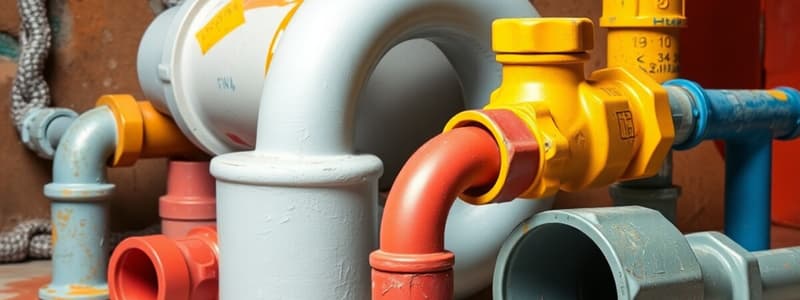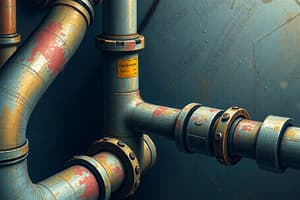Podcast
Questions and Answers
What is the purpose of adding flux to an end feed fitting joint?
What is the purpose of adding flux to an end feed fitting joint?
- To clean the inside of the joint
- To assist in the soldering process (correct)
- To provide structural support
- To prevent lead contamination
Which statement is true regarding the use of lead solder?
Which statement is true regarding the use of lead solder?
- It can be used on any plumbing system.
- It is preferred over lead-free solder for all applications.
- Lead solder is safe for drinking water.
- It should only be used on non-potable water systems. (correct)
What type of fitting typically does not have an O-ring?
What type of fitting typically does not have an O-ring?
- Press fit fittings (correct)
- Compression fittings
- Flange fittings
- Push fit fittings
What is the primary composition of lead-free solder?
What is the primary composition of lead-free solder?
Which of the following fittings requires pipes to be cleaned before soldering?
Which of the following fittings requires pipes to be cleaned before soldering?
What is the primary function of a manifold in plumbing?
What is the primary function of a manifold in plumbing?
Which type of fitting is specifically used for connecting a tap or float operated valve?
Which type of fitting is specifically used for connecting a tap or float operated valve?
When using plastic push fit fittings for waste or soil pipes, what is required for a successful joint?
When using plastic push fit fittings for waste or soil pipes, what is required for a successful joint?
What should be done before applying solvent cement to plastic solvent weld fittings?
What should be done before applying solvent cement to plastic solvent weld fittings?
What type of washers do tank connectors rely on to create a watertight seal?
What type of washers do tank connectors rely on to create a watertight seal?
Which type of fitting is commonly referred to as mechanical fittings?
Which type of fitting is commonly referred to as mechanical fittings?
What is the role of flux in soldering processes for plumbing?
What is the role of flux in soldering processes for plumbing?
What is the primary purpose of adding flux during solder ring fitting installation?
What is the primary purpose of adding flux during solder ring fitting installation?
Which statement about push fit fittings is incorrect?
Which statement about push fit fittings is incorrect?
Which type of compression fitting does not require manipulation of the pipe end?
Which type of compression fitting does not require manipulation of the pipe end?
What indicates that a brass fitting may be suffering from dezincification?
What indicates that a brass fitting may be suffering from dezincification?
In which scenario should lead pipe be connected to a new copper pipe carefully?
In which scenario should lead pipe be connected to a new copper pipe carefully?
How do press fit fittings create a watertight seal?
How do press fit fittings create a watertight seal?
What is the role of the grab ring in push fit fittings?
What is the role of the grab ring in push fit fittings?
Which fitting type is specifically designed to connect pipes under high pressure and below ground?
Which fitting type is specifically designed to connect pipes under high pressure and below ground?
Flashcards
What is an End Feed Fitting?
What is an End Feed Fitting?
This fitting uses a solder ring to create a watertight seal. The pipe is cleaned, flux is applied, and solder needs to be added when the fitting is heated. A lead-free solder must be used for hot and cold water systems.
What is a Compression Fitting?
What is a Compression Fitting?
A type of plumbing fitting used to connect copper pipes. It uses a compression ring to create a watertight seal.
What are Solvent Fittings?
What are Solvent Fittings?
These fittings use a solvent to join plastic pipes. The solvent melts the plastic of both the fitting and the pipe, creating a strong bond.
What are Push Fit Fittings?
What are Push Fit Fittings?
Signup and view all the flashcards
What are Plumbing Fittings?
What are Plumbing Fittings?
Signup and view all the flashcards
Tap Connector
Tap Connector
Signup and view all the flashcards
Flexible Connectors
Flexible Connectors
Signup and view all the flashcards
Manifold
Manifold
Signup and view all the flashcards
Tank Connector
Tank Connector
Signup and view all the flashcards
Plastic Push Fit Fittings
Plastic Push Fit Fittings
Signup and view all the flashcards
Plastic Compression Fittings
Plastic Compression Fittings
Signup and view all the flashcards
Plastic Solvent Weld Fittings
Plastic Solvent Weld Fittings
Signup and view all the flashcards
Solder Ring Fittings
Solder Ring Fittings
Signup and view all the flashcards
Compression Fittings
Compression Fittings
Signup and view all the flashcards
Push Fit Fittings
Push Fit Fittings
Signup and view all the flashcards
Press Fit Fittings
Press Fit Fittings
Signup and view all the flashcards
Threaded Fittings (LCS)
Threaded Fittings (LCS)
Signup and view all the flashcards
Dezincification
Dezincification
Signup and view all the flashcards
Leadlock Fitting
Leadlock Fitting
Signup and view all the flashcards
O-Ring Seal Fittings
O-Ring Seal Fittings
Signup and view all the flashcards
Study Notes
Common Plumbing Materials and Jointing Processes
- Various methods exist for joining plumbing materials, including copper, plastic, and others. These methods differ in their procedures and materials involved.
LCS Fittings
- Threaded: Joints use BSPT threads, along with PTFE or hemp/paste for a watertight seal.
- Compression: These use a tapered rubber seal for a watertight connection.
- Unions: Usually have flat or conical faces for creating a watertight seal.
- Flanges: Employ rubber or fibre gaskets for watertight seals in flat-face joints.
Tap Connectors
- Connect supply pipework to tap/float-operated valves.
- A fibre washer is used to create a watertight seal.
Flexible Connectors
- Facilitate connecting pipework or appliances with waste pipes.
- Typically 300mm long, some include internal isolators.
Manifolds
- Allow a single pipe to be divided into several pipes (e.g. microbore, underfloor heating).
- Conversely, several pipes can be connected to a single main pipe (e.g. waste pipes).
Tank Connectors
- Create supply points from cisterns, like for cold water distribution.
- Employ rubber and neoprene washers for watertight seals.
Plastic Push-Fit Fittings
- These can connect plastic to copper or plastic to plastic.
- Pipe ends must be cut square and burr-free.
- Sleeves/inserts support plastic pipes.
- An O-ring creates a watertight seal.
- Silicon gel aids insertion and lubrication.
- Reusable fittings often require tools for removal.
Plastic Compression Fittings (Mechanical)
- Connect copper or plastic pipes.
- Seals/O-rings are crucial for watertightness.
- Burrs on the pipes must be removed.
- An integral support ring is placed behind the seal.
Plastic Solvent Weld Fittings
- Used for ABS and uPVC waste/soil pipes.
- Surfaces are cleaned, and solvent cement is applied.
- Components are joined and chemically melt together.
- Joints cure within minutes.
Plastic MDPE Fittings
- Allow plastic-to-plastic connections (can also be used in combination with copper or screw-thread LCS).
- Can be push-fit, compression, or fusion-welded.
Solder-Ring Fittings
- The pipe and joint are cleaned.
- Flux is applied.
- Solder is in an integral ring.
- Heat is applied to allow the solder to flow.
- The joint is allowed to cool.
- The joint is wiped clean with a cloth.
Push-Fit Fittings
- Suitable for pressure plastic or copper pipes.
- Pipe ends must be cut square and burr-free.
- O rings create a watertight seal.
- Sleeve or insert supports plastic pipes.
- Lubrication (e.g. silicon gel) can assist installation.
Compression Fittings (Type A)
- Non-manipulative fittings.
- Require square cutting and burr removal; an olive is used; the fitting is tightened using an adjustable wrench.
- Suitable for half-hard copper and plastic pressure pipe.
Compression Fittings (Type B)
- Manipulative fittings.
- Involve using a swaging tool.
- More durable than Type A but cannot be separated without the tool.
- Often used for high and below ground pressure pipe work.
Brass Fittings
- An alloy of copper and zinc.
- Can suffer from dezincification, creating a white powdery zinc oxide coating, and making the fitting brittle.
- Modern fittings are marked CZ or DZR to indicate dezincification resistance.
Press-Fit Fittings
- An O-ring is used to create a watertight seal.
- Components are pushed into place.
- Then clamped into position using a mechanical tool.
Lead Pipe Considerations
- When lead pipe is discovered, it is typically advised to remove it.
- Specialised fittings (e.g., leadlock) can sometimes be used for carefully connecting other pipes to an existing lead pipe.
- The standard "wiped joint" is no longer permitted.
Materials for Joints (Copper, Steel, Plastic)
- Flux: Active fluxes (acid-based) aid solder flow, passivate, and prevent oxidation. Non-active fluxes (paraffin-based) are used for cleaning pipes.
- PTFE Tape/String: Used on threads of low carbon steel pipes for a watertight seal.
- Hemp/Paste: Alternatively, hemp and paste are placed onto the threads of the pipe.
- Gaskets: Rubber and fiber gaskets are employed in flange-faced joints.
- Solvent Weld: Used on plastic waste/soil pipes.
- Rubber Seals (silicon): Used for seals, especially on plastic waste/soil pipes.
- O Rings: Used in push-fit, waste/soil piping.
Hazards
-
Potential for burns to people and property.
-
Fires.
-
Explosions.
-
Oxidation from flux.
-
Pitting.
-
Fumes from soldering and solvent welding.
-
Earthing is crucial for metallic pipes. This includes equipotential, supplementary, and temporary continuity bonding.
-
Metallic tape is required to track all hidden plastic pipework behind walls.
Quality Assurance
- WRAS approval, British Standard kite mark, and BBA approval are crucial for all components in installations.
- BRE Building Research Establishment and IOPHE offer advice and guidance.
True/False Questions and Answers
- Compression fittings have olives: TRUE.
- End feed fittings have a solder ring: FALSE.
- Can I use solder with Push Fit Fittings? NO.
- Press-fit fittings have O rings: TRUE.
Studying That Suits You
Use AI to generate personalized quizzes and flashcards to suit your learning preferences.




